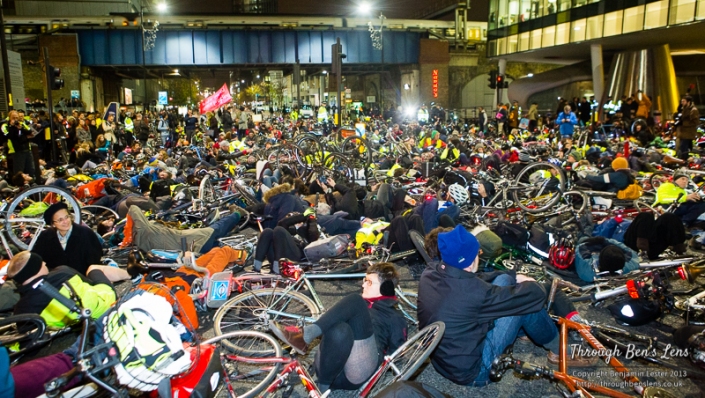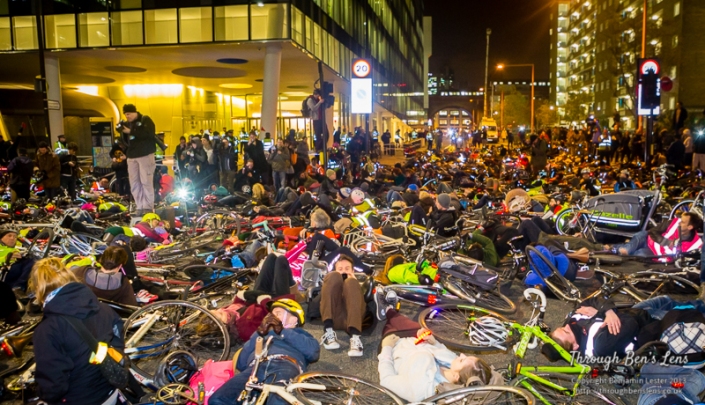TfL
Test your awareness
Video Posted on
An old psychology test seems to have been re-appropriated by TfL to show people how easy it is to overlook something that should be obvious.
A good test if you’ve not seen it before, though the link to cycling and driver awareness is questionable/tenuous at best
Dinosaur MPs on Britain’s Transport Committee
Link Posted on Updated on
Dinosaur MPs on Britain’s Transport Committee
For the many of you fortunate enough to not view the committee’s near two-hour session about cycle safety on Monday afternoon, I can tell you that there are scarcely enough words to describe how disheartening and shambolic it was. To give you a flavour of one journalist’s reaction, follow this link to see a collation of running tweets from the event.
The session followed the recent deaths of six cyclists in London and saw the 11-member committee first quiz a series of cycling representatives and police, then a trio of bigwigs from the road haulage world, along with Andrew Gilligan, cycle adviser to London’s mayor, Boris Johnson, and an expert from the Transport Research Laboratory.
For the most-part, it seemed as if the MPs were concerned with minor issues. For instance, Sarah Champion (Labour MP) wondered whether helmet use could be made compulsory. How a bike helmet is supposed to help someone crushed by an HGV is something that we might wonder in response… The headphones issue was also raised.
Following this, Jason McCartney (Tory MP) asked if there was a war going on between cars and bikes. His party colleague, Martin Vickers, then asked – and he was being entirely serious – if the panel felt cyclists should “contribute” financially to the upkeep of roads. Yes, that’s right. The road tax question, the litmus test for someone who not only doesn’t understand the very basics about cycling policy but hasn’t the barest minimum of intellectual curiosity about it. Silly enough in a pub conversation. For an MP, let alone an MP on the transport select committee, let alone an MP on the transport select committee discussing cycling, it’s unforgivable.
An extract from a Guardian article on the subject encapsulates some real truths about how cycling issues are addressed by the people in power:
“…when it comes to cycling policy in Britain, we remain, for the most part, in the age of the dinosaur. The odd politician talks an occasional good game on bikes, but look at too many mainstream MPs and we’re right back in the 1960s, where bikes are a toy, or a faddish “pursuit”, perilous and mistrusted, while all must lie down in homage to “the economy”, a narrowly-defined set of interests with motorised pistons beating at their heart.”
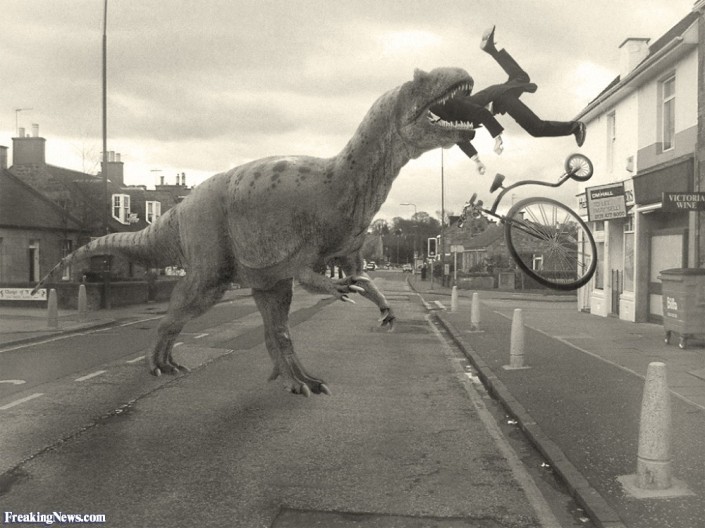
Jim Dobbin (Labour MP) then proceeded to regale the committee with a series of anecdotes about misbehaving cyclists and scratched car paintwork before suggesting that currently cycle safety woes could be addressed by requiring cyclists to register themselves and their bikes, and to pass proficiency tests in order to gain a cycling licence.
Although many people may believe that Dobbin’s prescription is a good one, it is worth remembering that not a single country on this planet implements these things for the simple reason that they massively curtail bicycle use. Bicycles don’t have the capacity to be the killing machines that cars and lorries sometimes are, and cyclists don’t produce CO2 or damage the roads to the same degree as motor vehicles; requiring them to be registered and licensed (presumable at some cost) seems a preposterous and misguided contribution to a meeting about cycle safety. And while cycling proficiency is a reasonable issue, no one at the committee meeting seemed aware of the bikeability scheme.
Part two was possibly even more depressing still. The MPs, who had been quite interrogative towards the cycle groups (albeit mainly on irrelevancies) gave the haulage group representatives a far easier time. Jack Semple, policy head of the Road Haulage Association, was left utterly unchallenged when he repeatedly singled out cyclist behaviour as the reason for them being killed by lorries; an assertion for which there is, as far as I understand, no evidence.
What was missing from the committee meeting was an acknowledgement of the fact that cities are changing places. Whereas once they competed on things like skyscrapers and parking spaces, the most desirable cities in the world are now places where there is an emphasis on liveability – a more human-centred approach. People don’t want to live with urban motorways and the noise, congestion, and pollution that they bring with them. The nicest cities are more pedestrianised, with pavement cafes, and safe, communal spaces. They also prioritise (and even incentivise) walking and cycling in such a way as to make them more convenient than driving (just look at Groningen in The Netherlands for the perfect example).
To illustrate this point, it is worth noting that there are three big annual lists of the world’s most liveable cities. Not one of them features anywhere in the UK.
Things clearly need to change, and the mass extinction of political dinosaurs seems to be a necessary first step.
London Cyclists stage mass ‘die-in’
Following the recent deaths on London’s busy streets, cyclists in the capital held a vigil and protest outside the headquarters of TfL (Transport for London). Despite the cold we lay down next to our bikes and made a pretty bold statement that TfL can no longer ignore.
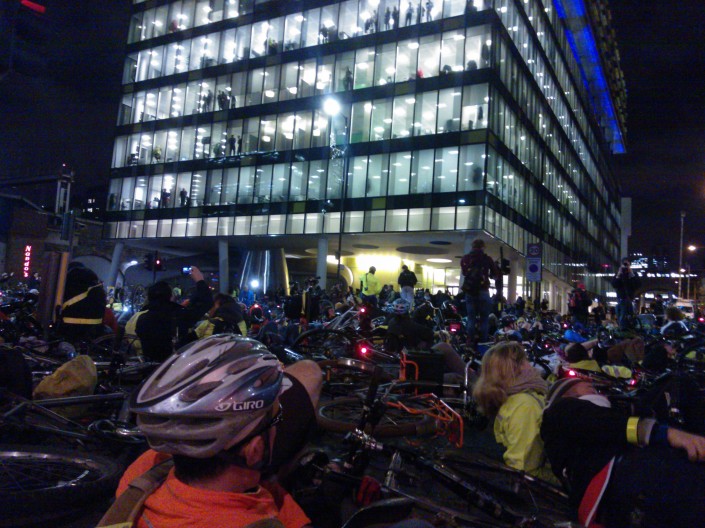
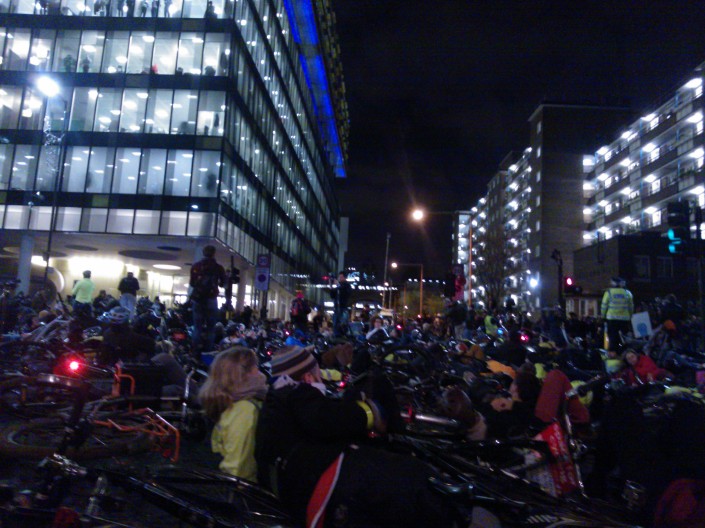
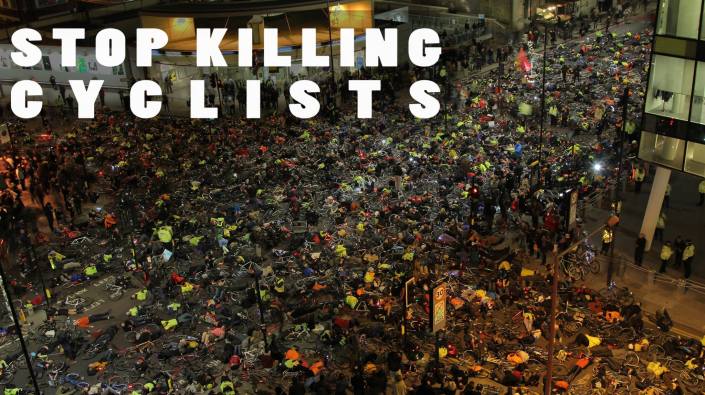
London’s die-in was reminiscent of the famous Dutch die-in that took place in the 1970s on the museumplein outside the Rijksmuseum.
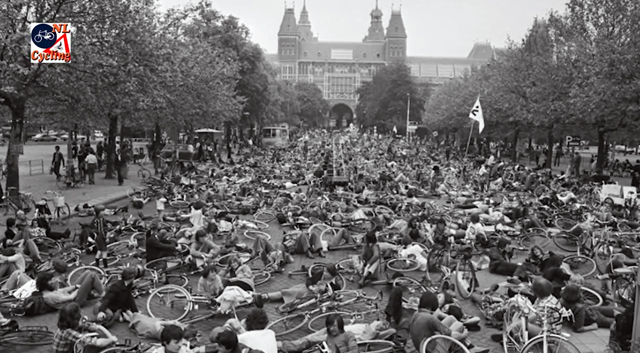
The Dutch campaign was motivated by the number of people (particularly children) who were dying on the roads. Their protest achieved remarkable things in terms of their infrastructure, and 40 years down the line they are still reaping the benefits.
Dutch solutions to London’s problems aren’t really so radical, and their implementation would only requires a modest degree of commitment from the government.
Look at how they deal with HGVs and roundabouts – surely this sort of infrastructure is desirable for everyone, no?
On a side note, my sister was interviewed by the BBC during the protest, and her vox-pop even made it onto the evening news! I will try to upload a video, if I can find one…

And the BBCs coverage of the event (my sister at 1:04)…
and another one…
Related articles
- Cyclists lie outside Transport for London (TfL) headquarters to protest road deaths (express.co.uk)
- Thousands of cyclists lie down in the road for rush hour protest outside TfL’s Blackfriars HQ (standard.co.uk)
- http://www.huffingtonpost.co.uk/2013/11/29/stop-killing-cyclists_n_4361265.html?utm_hp_ref=uk
- http://www.bbc.co.uk/news/uk-england-london-25160874
- http://www.cyclingweekly.co.uk/news/latest/541453/cyclists-stage-mass-die-in-outside-transport-for-london-offices.html
Dutchman isn’t impressed by London’s cycling infrastructure
Video Posted on Updated on
A brief analysis of cycling conditions in London from David Hembrow.
As a Dutchman, Hembrow highlights the shortcomings of British infrastructure that we have to live with. He makes the point that not only are the roads inadequate for cyclists, but that they aren’t really serving motorists much better either.
More than anything else, the thing that really struck me about this video was the shear volume of noise coming from the road. Motor vehicles make the urban environment a really unpleasant place to be.
Another video that focuses specifically on the shortcomings of London’s CS2 can be found here
Related articles
- London’s ‘cycling superhighways’ are ideal … for kamikazes | Charles Montgomery (theguardian.com)
- Cycle deaths leave London bewildered (bbc.co.uk)
- Upgrade London’s CS2 to Continental Standards – call to arms (dutchbikeguy.wordpress.com)
John Snow calls for improvements in cycling infrastructure
Video Posted on Updated on
http://www.bbc.co.uk/news/uk-politics-25046751
Veteran journalist John Snow is also an avid cyclist.
He has commuted by bike both to and from work every day for the last 40-odd years, and he raises some valid points about the dangers of riding a bike and the inadequacy of cycle safety provisions.
He talks about the probability of ‘big rewards’ for the first politician to re-draw the urban map and prioritise cyclists and pedestrians. In terms of combating obesity, reducing pollution, and making our cities more pleasant places to live, I think I can see why such a measure would be well received.
He states that, as humans, we respond to our surroundings. On the issue of cyclists who flout the law, the point he makes is that good behaviour will come when there are good provisions to protect and facilitate cycling. At the moment, it is a dog-eat-dog world out there on the roads; as the underdogs, cyclists are therefore put in a position of vulnerability, and have to make the most of their situation. Snow doesn’t condone bad behaviour on the roads, but he can at least appreciate why it happens.
Also of interest: http://www.bbc.co.uk/news/uk-25013438 and http://www.bbc.co.uk/news/uk-25014296
Related articles
- VIDEO: Snow’s verdict on dangers of cycling (bbc.co.uk)
- Cycling policy ‘getting better’ (bbc.co.uk)
Boris the idiot
Image Posted on Updated on

London’s mayor Boris Johnson has proposed banning cyclists from using headphones while they ride. In light of this picture, one wonders whether he could perhaps build himself a stronger platform from which to make his case…
Related articles
- Boris considers ban on cyclists wearing headphones while riding on London’s roads (standard.co.uk)
- Boris Blames Headphones for London’s Cycling Deathwave and Wants Them Banned (gizmodo.co.uk)
- Boris Johnson wants to ban cyclists from wearing headphones (metro.co.uk)
- Better cycling safety in London a political imperative for Boris Johnson (voiceofrussia.com)
- Boris Johnson: ‘Ban cyclists from wearing headphones’ (independent.co.uk)

